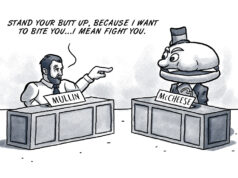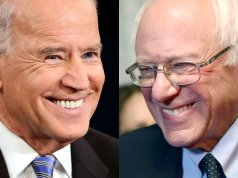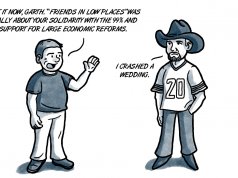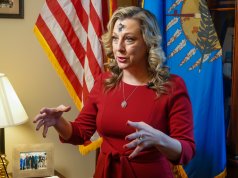(Editor’s Note: This is part three of NonDoc’s series on labor issues this week. Part one looked at labor union membership, part two recalled Oklahoma’s 2001 Right To Work election, and Point and Counterpoint commentaries addressed the question of what should be done to modernize federal labor laws.)
More than a year after Gov. Mary Fallin signed a bill into law banning Oklahoma cities from determining their own minimum wages, some national political figures are pushing to increase the federal minimum wage.
This time, the target is $15 per hour.
Presidential candidate and Vermont Sen. Bernie Sanders has proposed a bill to increase the minimum wage to $15 per hour, a marked increase from President Barack Obama’s Raise The Wage campaign, which has been clamoring for a federal increase to $10.10 per hour.
“Oklahoma has an uphill battle, because both the legislature and the governor have taken a strong stance against raising the minimum wage,” said Sarah Baker, communications director for the Oklahoma Democratic Party. “A federal increase is the only thing we can count on.”
While it’s Baker’s job to promote talking points for the state’s Democratic Party, people with other entities disagree with proposed wage increases.
“Oklahoma’s problem isn’t low wages, it’s a workforce that doesn’t have the right skills for the good-paying jobs that are out there,” said Mike Seney, senior vice president for policy analysis and strategic planning with the Oklahoma State Chamber of Commerce. “Rather than focusing on the pay for unskilled jobs, let’s get those unskilled workers trained so they can get better jobs with the possibility of advancement.”
Baker said she doesn’t think the issue is that simple.
“Having been a waitress in food service, I know how hard it is, and also having two children,” Baker said. “Our minimum wage for wait staff is only $2.13, and that hasn’t been raised in years. It’s almost impossible to take care of anyone on that.”
Seney, who called for the abolition of the minimum wage in a commentary for NonDoc’s Point-Counterpoint this week, said businesses (and, thus, workers) would benefit from fewer regulations.
“You don’t need a degree in economics to know that every form of government regulation on business affects the bottom line. Minimum wage is no different,” Seney said in a separate statement Wednesday. “When government arbitrarily increases labor costs, a business can either pass it on to the consumer or subtract it from profits, which means fewer dollars for growing that business. If it costs more to hire someone, a business’ ability to hire someone is decreased.”
That’s not how Rep. Eric Proctor (D-Tulsa) looks at the issue.
“For me, minimum wage is a moral issue, and I am 100 percent in favor of [the Sanders proposal],” Proctor said. “I have been a youth pastor, and my faith teaches me that we have an obligation to fight for our neighbors’ well-being.”
Proctor was one of the most vocal critics of SB 1023, which preempts cities and towns from setting higher minimum wages than the state’s.
“It is absolutely disgusting for someone that is making a six-figure salary — like our governor does — to say that someone in a municipality doesn’t have the right to vote to raise the wages of their neighbor,” Proctor said.
In a Labor Day editorial, the Tulsa World analyzed the merits of potentially raising the minimum wage, citing that the cost of living has increased since the minimum wage was last increased to $7.25 in 2009. The editorial ultimately ends in rough agreement with Seney: “Imposing artificial local wage inflation on our work force only pushes jobs to competing states and leaves Oklahomans unemployed.”
The editorial argues that, through “prosperity,” all wage levels will improve, bringing the lowest wage floor higher as well.
But that implies a real correlation between business productivity and wages, something that Proctor and others questioned.
According to a recent report from the Economic Policy Institute, inflation-adjusted hourly compensation of the median worker has risen just 8.7 percent from 1973 to 2014. Meanwhile, net productivity has grown 72.2 percent during the same period. The same institute argues that the last decade has produced no real wage improvements in a broad range of workers.
“To me, the minimum wage is the employer telling you, ‘If I could pay you any less, I would, but it’s against the law’,” said Jim Curry, president of the AFL-CIO’s Oklahoma chapter.
According to a release from Sanders’ presidential campaign, if the minimum wage had kept pace with productivity and inflation, it would currently be $26 an hour today.
But perhaps the free market is working.
A recent article from the Tulsa World cited several anecdotal examples of employers who are unable to fill positions at the minimum wage and are being forced to offer $8 per hour just to get applicants in the door. The employers mentioned are in the fast-food and automotive sales industries.
Polling shows raising minimum wage is popular
A January poll from Hart Research Associates showed 73 percent of registered voters favored raising the minimum wage to $12.50. In addition, the poll showed 63 percent favoring an increase all the way to $15 per hour.
Barring a change of heart in the Oklahoma Legislature, the only two options that remain are a federal increase or a voter-led state referendum.
“Oklahoma’s constitution is one of the most progressive documents in history,” Proctor said. “It was written by people who had been mistreated and gotten the short end of the stick. If it was put on the ballot to raise [the minimum wage], there is no doubt in my mind that it would pass overwhelmingly.”























